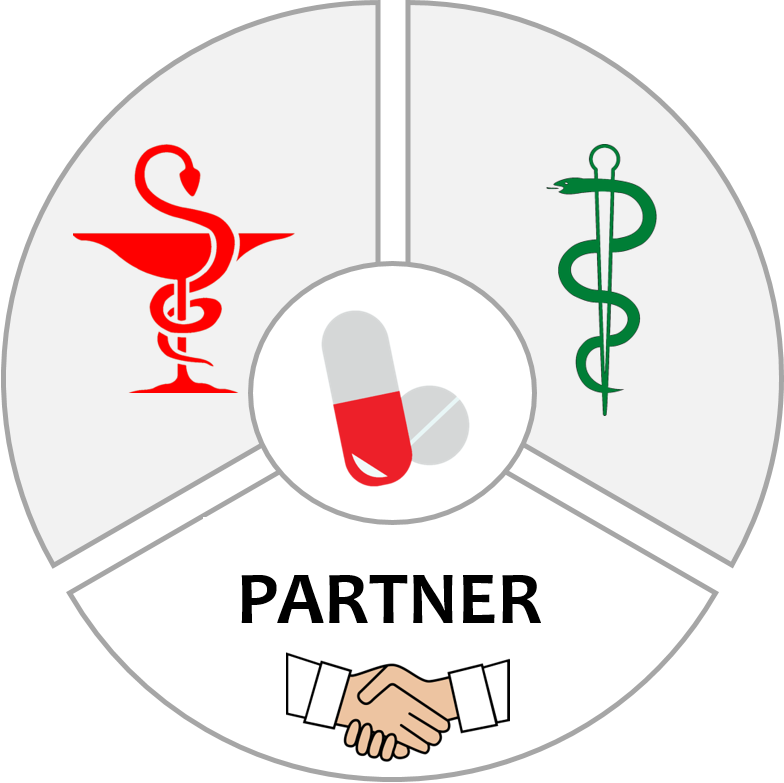Allgemein- und Familienmedizin



PARTNER - Kooperation von Hausarztpraxen und Apotheken zur Verbesserung der Medikationssicherheit bei Multimedikation
Akronym: PARTNER
Studiendesign: Multizentrische cluster-randomisierte Studie
Laufzeit: 01.06.2022 bis 31.05.2025
Status: Laufend
Ethikvotum: Ethik Kommission der Ärztekammer Westfalen-Lippe und der Westfälischen Wil-helms-Universität, Aktenzeichen: 2022-774-b-S
Förderung: Innovationsfonds des Gemeinsamen Bundesausschusses (01VSF21038); keine Förderung durch pharmazeutische Industrie oder Medizingerätehersteller
Team Standort Bielefeld:
- Projektleitung: Svetlana Puzhko, MD, PhD
- Wissenschaftliche Mitarbeiterin: Kerstin Bernartz, M. Sc. Public Health
- Studienassistentinnen: Stephanie Picker-Huchzermeyer, Helga Nolte
Hintergrund:
Multimedikation (Einnahme von 5 oder mehr Arzneimitteln) ist nicht per se inadäquat. Sie erhöht jedoch das Risiko unerwünschter Arzneimittelwirkungen, insbesondere bei älteren Patientinnen und Patienten. Leitlinien empfehlen daher mindestens einmal jährlich eine Medikationsanalyse durchzuführen, um Indikationen zu überprüfen, Ri-siken zu erkennen und ein adäquates Selbstmanagement sicherzustellen. Medikati-onsanalysen sind häufig komplex und zeitintensiv, sodass eine Zusammenarbeit von Hausarzt/-ärztin und Apotheker/in zur Optimierung der Medikationssicherheit sinnvoll sein kann. Voraussetzung ist ein koordinierter und strukturierter Ablauf.

Fragestellung:
Kann die PARTNER-Intervention im Vergleich zu erweiterter Routineversorgung die Medikationssicherheit bei älteren Menschen mit Multimedikation erhöhen?
Projektbeschreibung:
Wir führen eine multizentrische, zweiarmige, sog. cluster-randomisierte Studie durch. Das Projekt wird von einer gesundheitsökonomischen Auswertung und einer Prozessevaluation begleitet. Cluster-randomisiert bedeutet, dass Praxen zufällig in die Interventions- oder Kontrollgruppe gelost werden. Alle dazugehörigen Studienpatientinnen und patienten werden gemäß Gruppenstatus behandelt.
Mindestens 45 Hausarztpraxen werden etwa ab Oktober 2022 (nach zustimmender Bewertung durch die Ethikkommission) an drei Studienstandorten insgesamt 352 Patienteninnen und Patienten mit potenziell unangemessener Multimedikation in die Studie einschließen (ca. 5 bis 8 je Praxis), die 65 Jahre oder älter sind.
In der PARTNER-Interventionsgruppe erfolgen:
- Eine gemeinsame Fallkonferenz von Hausarzt/-ärztin und Apotheker/in über die Multimedikation der Studienpatienten und -patientinnen,
- Eine informierende und motivierende Beratung von Studienpatienten und -patientinnen in der Apotheke,
- Eine gemeinsame Entscheidungsfindung von Hausarzt/-ärztin und Patient/-in zur Änderung bzw. zum Beibehalten der Medikation.
In der Kontrollgruppe ist eine Medikationsüberprüfung durch die Apotheke vorgesehen. Darüber hinaus werden die Studienpatienten und -patientinnen in beiden Gruppen in ihrer Hausarztpraxis regelhaft betreut.
Im primären Endpunkt wird gemessen, ob die Studienpatienten bzw. -patientinnen der Interventionsgruppe weniger problematische Medikamente einnehmen, als die Studienpatienten und -patientinnen der Kontrollgruppe. In weiteren Endpunkten werden Aspekte des Wohlbefindens von Studienpatienten und -patientinnen erfragt.

Externe Projektpartner:
- Klinikum der Universität München, Institut für Allgemeinmedizin, Professur für Klinische Versorgungsforschung (Prof. Dr. Tobias Dreischulte; Konsortialfüh-rung)
- Universität Witten/Herdecke, Institut für Allgemeinmedizin und Ambulante Gesundheitsversorgung (IAMAG) (Prof. Dr. med. Achim Mortsiefer)
- Universitätsklinikum Heidelberg, Kooperationseinheit Klinische Pharmazie (Prof. Dr. Hanna Seidling)
- aQua - Institut für angewandte Qualitätsförderung und Forschung im Gesundheitswesen GmbH (Dr. Petra Kaufmann-Kolle, Patrizio Vanella)
- Universitätsklinikum Regensburg, Zentrum für Klinische Studien (Prof. Dr. Michael Koller)
- Techniker Krankenkasse, Hamburg
Wenn Sie Interesse an der Studienteilnahme oder Fragen haben, sprechen Sie uns gerne an – per Email an projekt-partner@uni-bielefeld.de oder telefonisch unter +49 (0)521 / 106 86818.
Stichwörter: Multimedikation, Medikationssicherheit, Arzt-Apotheker-Kooperation, Fehl- und Überversorgung, Arzneimittelversorgungsqualität, interprofessionelle Zusammenarbeit, Versorgungsforschung